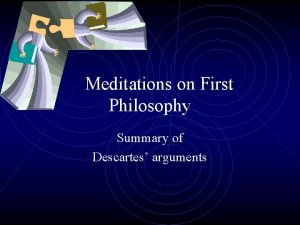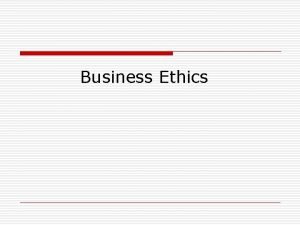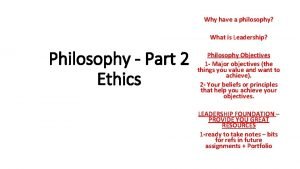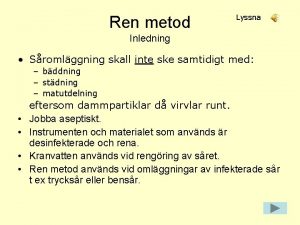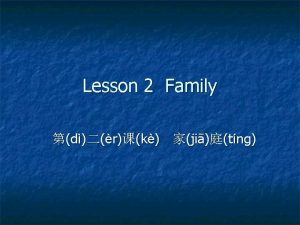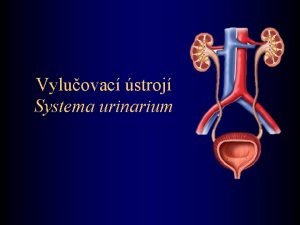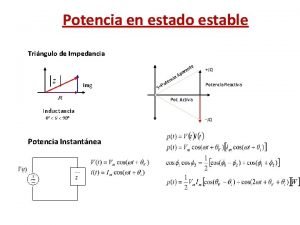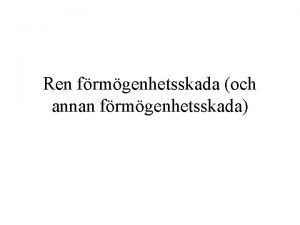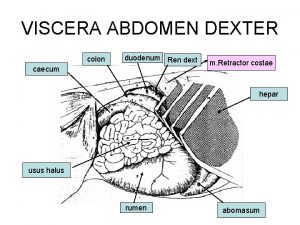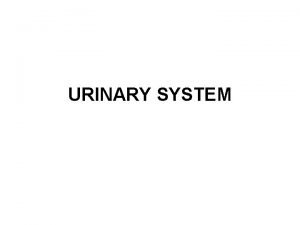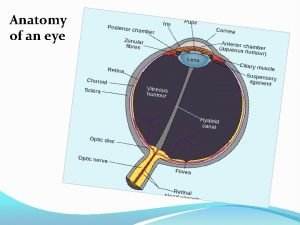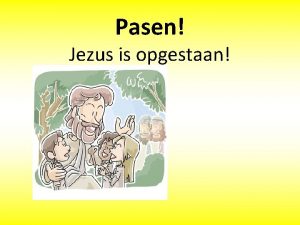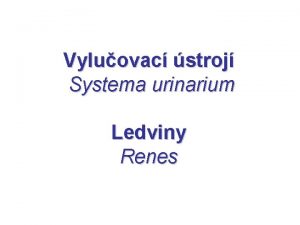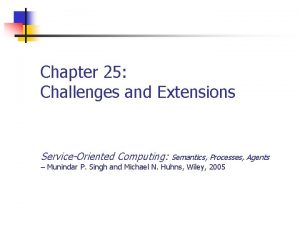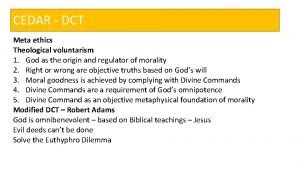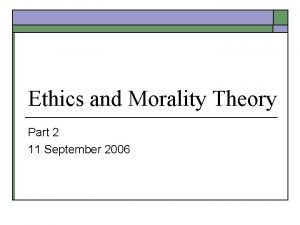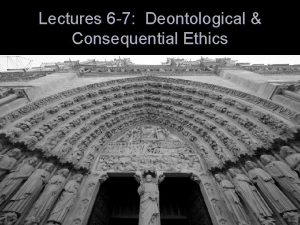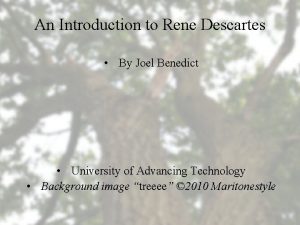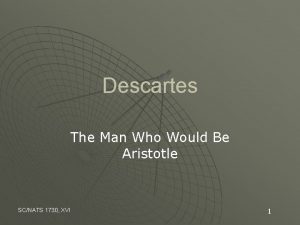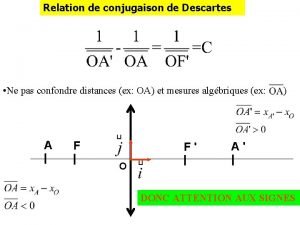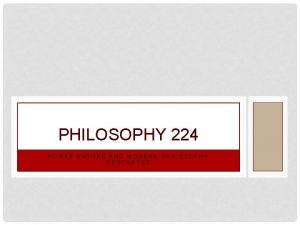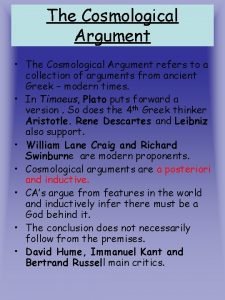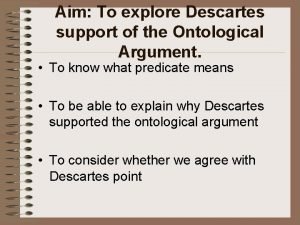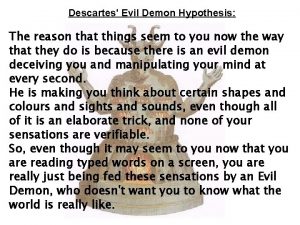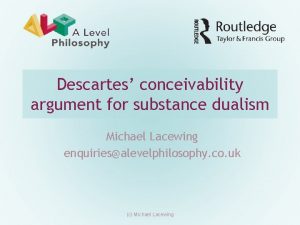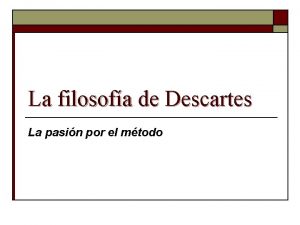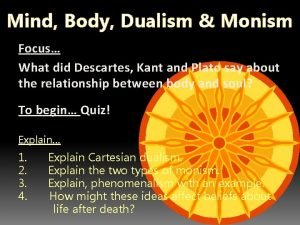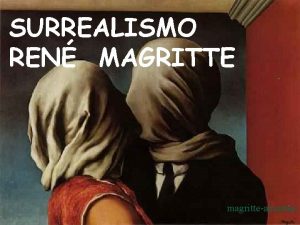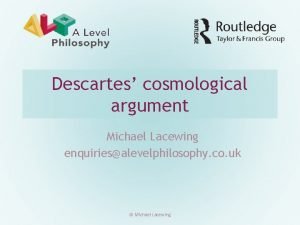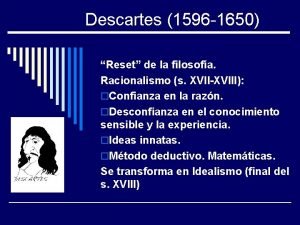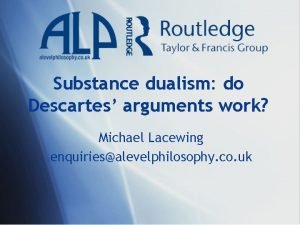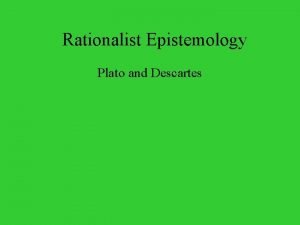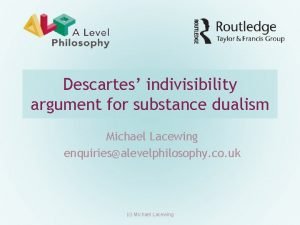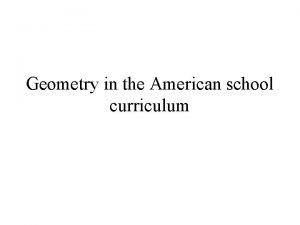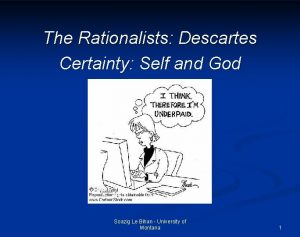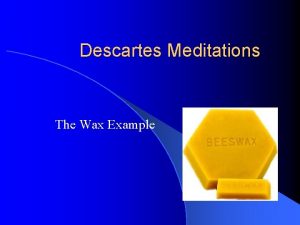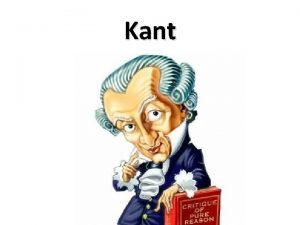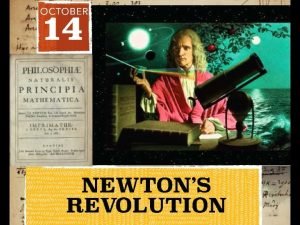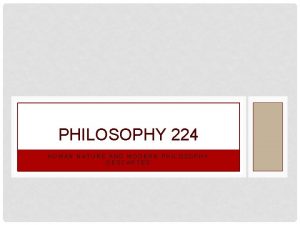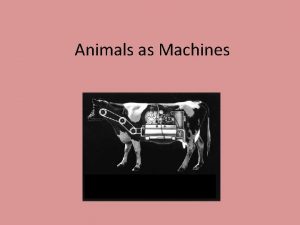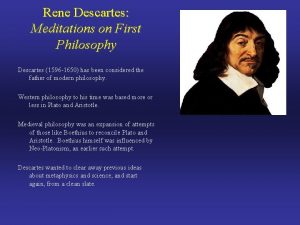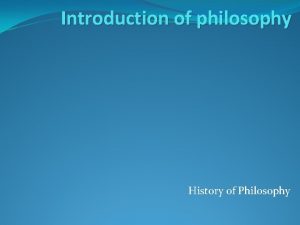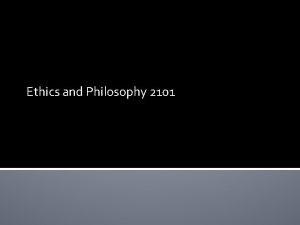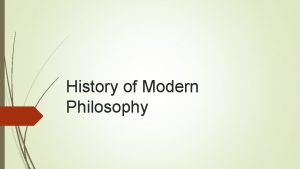Ethics in Modern Philosophy Ren Descartes Descartes Ethics























































![Kant on Promises • [a] Suppose however that he resolves to do so: then Kant on Promises • [a] Suppose however that he resolves to do so: then](https://slidetodoc.com/presentation_image_h2/756857bc70e102bb2b983a606a31c5a7/image-56.jpg)
![Kant on Promises • [b] I change then the suggestion of selflove into a Kant on Promises • [b] I change then the suggestion of selflove into a](https://slidetodoc.com/presentation_image_h2/756857bc70e102bb2b983a606a31c5a7/image-57.jpg)



![Kant on Suicide • [b] It is asked then simply whether this principle founded Kant on Suicide • [b] It is asked then simply whether this principle founded](https://slidetodoc.com/presentation_image_h2/756857bc70e102bb2b983a606a31c5a7/image-61.jpg)


![Talent: Perfect Obligation? • [b] He sees then that a system of nature could Talent: Perfect Obligation? • [b] He sees then that a system of nature could](https://slidetodoc.com/presentation_image_h2/756857bc70e102bb2b983a606a31c5a7/image-64.jpg)
![Talent: Imperfect Obligation • [c] but he cannot possibly will that this should be Talent: Imperfect Obligation • [c] but he cannot possibly will that this should be](https://slidetodoc.com/presentation_image_h2/756857bc70e102bb2b983a606a31c5a7/image-65.jpg)


![Charity: Perfect Obligation? • [b] Now no doubt if such a mode of thinking Charity: Perfect Obligation? • [b] Now no doubt if such a mode of thinking](https://slidetodoc.com/presentation_image_h2/756857bc70e102bb2b983a606a31c5a7/image-68.jpg)
![Charity: Imperfect Obligation • [c] But although it is possible that a universal law Charity: Imperfect Obligation • [c] But although it is possible that a universal law](https://slidetodoc.com/presentation_image_h2/756857bc70e102bb2b983a606a31c5a7/image-69.jpg)








































- Slides: 109

Ethics in Modern Philosophy

René Descartes

Descartes’ Ethics • The goal of human life is happiness. • Happiness is mental flourishing, contentment, and tranquillity: “to love life without fearing death. ” • Happiness requires a healthy mind. • The “true health of the mind” consists in developing wisdom, which is “true and sound judgment. ”

Descartes’ Ethics • Wisdom requires knowledge and the use of reason. • Reason must, in particular, control the passions and “examine and consider without passion” our options and ends, so that “we shall always choose the better. ”

Descartes’ Ethics • Virtue is reasoning constantly and well: “a firm and constant will to bring about everything we judge to be the best and to employ all the force of our intellect in judging well. ”

Princess Elizabeth

Morality and Rationality • Is happiness, as described by Descartes, achievable? • Reason and feeling are not so easily distinguished. • Rational control is not a purely mental phenomenon.

Morality and Rationality • Good judgment, moreover, depends on experience. • Experience trains our senses and our passions, making us sensitive to the right things and enabling us to feel the right emotions. • Thinking about moral problems and making moral choices is at least as much a matter of feeling as of reason.

Conscience • We frequently act on the basis of conscience. • Conscience ratifies our passions to reason, declaring them as acceptable or unacceptable. • Reason acts on premises that conscience provides. • Reason thus cannot act independently of feeling. • Conscience and some passions play important roles in moral thinking.

Morality and Health • Morality is not just a matter of health. • If all moral error is illness, then we have an all-purpose excuse. • We can no more be blamed for immorality than we can for being sick. • But morality is not therapy. We have free will.

Consequences • Assessing consequences requires knowing what the consequences of an act will or might be at an indefinite distance into the future. • It also requires knowing how the values of all those potential consequences compare with one another. • The knowledge required to reach moral conclusions on such a theory must be infinite. • It would follow that moral knowledge is impossible.

David Hume (1711 -1776)

Hume’s Ethics • Morals have an influence on actions and affections • Reason alone can have no such influence • So, morality is not a conclusion of reason • It consists of no matter of fact

Is —> Ought • Moral “reasoning” goes from is and is not to ought and ought not • How can we go from is to ought? • Reason supplies no connection

Feelings • Why is cruelty wrong? • Why is generosity good? • No fact of the matter to be found in them • “. . . ’tis the object of feeling, not of reason. It lies in yourself, not in the object. ” • Sentiment or feeling takes us from is to ought

Slave of the passions • “Reason is, and ought to be, the slave of the passions. ” • These feelings are particular • “An action or sentiment, or character s virtuous or vicious; why? Because its view causes a pleasure or uneasiness of a particular kind. ” • Moral sense: capacity for the feelings that constitute the basis for our moral judgments

Is Hume a Subjectivist? • Subjectivism: Moral truth depends on our subjective states of mind • Moral truths depend on feelings • Feelings are subjective states of mind

Moral realism • Moral realism: Moral truth depends on facts that are independent of us • Is there a real basis for our feelings? • Is our moral sense sensing anything real?

Realism vs. Subjectivism • Is morality like color? • Color: There is a real basis for our color perceptions, which are quite regular – Constant over time – Intersubjective agreement – Physical basis: wavelengths of light

Realism vs. Subjectivism • Or is morality like humor? • Humor: judgments not very regular – – – Not very constant over time Lots of disagreement No apparent physical basis Matter of taste De gustibus non disputandum

Why there are no turtlefights

Homer’s head x-ray

The pit-bull solution


Immanuel Kant Reason in Ethics

Immanuel Kant (1724 -1804) • Practical test: How do we tell right from wrong? • Theoretical question: What makes right actions right, and wrong actions wrong?

Rational —> Right • Right acts are rational • Wrong acts are irrational • Why be moral? It’s the rational thing to do

Intrinsic good • Intrinsic good: good for its own sake • Instrumental good: good for the sake of something else • What is good for its own sake? • Aristotle: Happiness

Unqualified good • Unqualified good: good unconditionally, good no matter what • Qualified good: good for something, good under certain conditions • What is good without qualification?

Unqualified good • Unqualified good: good unconditionally, good no matter what • Qualified good: good for something, good under certain conditions • What is good without qualification? • Kant: a good will

Good Will • “Nothing can possibly be conceived in the world, or even out of it, which can be called good, without qualification, except a good will. ”

Virtues • “Intelligence, wit, judgement, and the other talents of the mind, however they may be named, or courage, resolution, perseverance, as qualities of temperament, are undoubtedly good and desirable in many respects; but these gifts of nature may also become extremely bad and mischievous if the will which is to make use of them, and which, therefore, constitutes what is called character, is not good. ”

Happiness • “It is the same with the gifts of fortune. Power, riches, honour, even health, and the general well-being and contentment with one's condition which is called happiness, inspire pride, and often presumption, if there is not a good will to correct the influence of these on the mind, and with this also to rectify the whole principle of acting and adapt it to its end. ”

Impartial Rational Spectator • “The sight of a being who is not adorned with a single feature of a pure and good will, enjoying unbroken prosperity, can never give pleasure to an impartial rational spectator. Thus a good will appears to constitute the indispensable condition even of being worthy of happiness. ”

Good Will • What is a good will? – (1) Deciding on the basis of universal considerations – (2) Deciding on the basis of respect – (Feminist critics of Kant) Caring

Universality • Good will: acts on the basis of universal considerations • Not influenced by “subjective, particular determinations” • “the proper and inestimable worth of an absolutely good will consists just in this, that the principle of action is free from all influence of contingent grounds. ”

Duty • A person has a good will, • and his/her act has moral worth, • when he/she acts from duty, • out of respect for the moral law

Two kinds of moral theory • Consequentialism: the value of an act depends entirely on its consequences • Deontologism: the value of an act depends on more than consequences

Evaluating Actions • Character —> Motive —> Intention —> Action —> Consequences • Consequentialists evaluate by what (might reasonably be expected to) come after the act • Deontologists judge by what comes before the act

Evaluating Intentions • Kant is an extreme deontologist • Moral quality of an act does not depend on consequences at all • We judge act by agent’s intentions • Maxim: “subjective principle of action” • Rule reflecting agent’s intention

Imperatives • Imperative: expresses command or obligation • Hypothetical imperative: “If you are in circumstance C (or want D), then do A. ” • Categorical imperative: “Do A. ”

Hypothetical Imperatives • Hypothetical imperatives are conditional: • If. . . do. . or If. . . don’t. . • depend on circumstances, goals, desires • means to end: qualified goods

Categorical Imperative • “Do. . . ” or “Don’t. . . ” • Independent of goals, desires, circumstances • Applies universally • Appropriate to unqualified goods • There is only one unqualified good— • a good will

The Categorical Imperative • There is only one possible categorical imperative: • “You ought to have a good will” • Good will acts only on universal considerations • “You ought to act on universal considerations” • “You ought to act on principle”

Formula of Universal Law • “Act only on that maxim you can at the same time will to be universal law. ” • Act as if everyone were going to act according to your maxim • Don’t make an exception of yourself

A Moral Test • Test for action A: – (a) Identify A’s maxim

A Moral Test • Test for action A: – (a) Identify A’s maxim – (b) Ask, “Could it be a universal law? ” – If not: A is unjust

A Moral Test • Test for action A: – (a) Identify A’s maxim – (b) Ask, “Could it be a universal law? ” – If not: A is unjust – If so: (c) Ask, “Could I will it to be a universal law? ” – If not: A is immoral – If so: A is permissible

Simple Case • Should I steal? – (a) Identify maxim: Steal! – (b) Ask, “Could it be a universal law? ” – Could everyone go around stealing from everyone else? No: • There would be no such thing as property • There would be no such thing as stealing – So, stealing is unjust

Kant’s Theory Too narrow? (False negatives) • Permissible Too broad? (False positives) Maxim can be willed as universal law

False positives/negatives • False positives? • Animals: – Pulling kitten tails • Detailed maxims: – Lying to Hans on May 12, 2009 – Shooting Michael if he hops, juggles, and sings the Catalina Magdalena Lupensteiner Wallabeine song • False negatives? • Economic acts: – Buying Apple stock – Practicing law – Eating at Mineo’s • Playing roles: – Playing the bass – Playing wide receiver • Being where you are

Kant’s Examples • To Self To Others • Perfect obligation suicide promises • Imperfect obligation talents charity

Perfect/Imperfect Obligations • Perfect obligations: specific obligations to specific people— give others rights— unjust to violate them • Imperfect obligations: allow choice in how to fulfill— give no one else rights— wrong, but not unjust, to violate them

Perfect Obligations • To self: not to commit suicide • To others: to repay debts; more generally, to keep promises

Kant on Promises • 2. Another finds himself forced by necessity to borrow money. He knows that he will not be able to repay it, but sees also that nothing will be lent to him unless he promises stoutly to repay it in a definite time. He desires to make this promise, but he has still so much conscience as to ask himself: "Is it not unlawful and inconsistent with duty to get out of a difficulty in this way? "
![Kant on Promises a Suppose however that he resolves to do so then Kant on Promises • [a] Suppose however that he resolves to do so: then](https://slidetodoc.com/presentation_image_h2/756857bc70e102bb2b983a606a31c5a7/image-56.jpg)
Kant on Promises • [a] Suppose however that he resolves to do so: then the maxim of his action would be expressed thus: "When I think myself in want of money, I will borrow money and promise to repay it, although I know that I never can do so. " Now this principle of self-love or of one's own advantage may perhaps be consistent with my whole future welfare; but the question now is, "Is it right? "
![Kant on Promises b I change then the suggestion of selflove into a Kant on Promises • [b] I change then the suggestion of selflove into a](https://slidetodoc.com/presentation_image_h2/756857bc70e102bb2b983a606a31c5a7/image-57.jpg)
Kant on Promises • [b] I change then the suggestion of selflove into a universal law, and state the question thus: "How would it be if my maxim were a universal law? "

Kant on Promises • Then I see at once that it could never hold as a universal law of nature, but would necessarily contradict itself. For supposing it to be a universal law that everyone when he thinks himself in a difficulty should be able to promise whatever he pleases, with the purpose of not keeping his promise, the promise itself would become impossible, as well as the end that one might have in view in it, since no one would consider that anything was promised to him, but would ridicule all such statements as vain pretences.

Keeping Promises • Maxim: “make false promises” • What if everyone did that? • Contradiction: no such thing as promising • So, making false promises is unjust and so wrong • We have a perfect obligation to keep our promises

Kant on Suicide • 1. A man reduced to despair by a series of misfortunes feels wearied of life, but is still so far in possession of his reason that he can ask himself whether it would not be contrary to his duty to himself to take his own life. Now he inquires whether the maxim of his action could become a universal law of nature. • [a] His maxim is: "From self-love I adopt it as a principle to shorten my life when its longer duration is likely to bring more evil than satisfaction. "
![Kant on Suicide b It is asked then simply whether this principle founded Kant on Suicide • [b] It is asked then simply whether this principle founded](https://slidetodoc.com/presentation_image_h2/756857bc70e102bb2b983a606a31c5a7/image-61.jpg)
Kant on Suicide • [b] It is asked then simply whether this principle founded on selflove can become a universal law of nature. • Now we see at once that a system of nature of which it should be a law to destroy life by means of the very feeling whose special nature it is to impel to the improvement of life would contradict itself and, therefore, could not exist as a system of nature; hence that maxim cannot possibly exist as a universal law of nature and, consequently, would be wholly inconsistent with the supreme principle of all duty.

Against suicide • • Suicide: destroy life for the sake of life Contradictory Can’t be universal law So, suicide is unjust, and thus wrong

Imperfect Obligation: Talent • 3. A third finds in himself a talent which with the help of some culture might make him a useful man in many respects. But he finds himself in comfortable circumstances and prefers to indulge in pleasure rather than to take pains in enlarging and improving his happy natural capacities. • He asks, however, whether [a] his maxim of neglect of his natural gifts, besides agreeing with his inclination to indulgence, agrees also with what is called duty.
![Talent Perfect Obligation b He sees then that a system of nature could Talent: Perfect Obligation? • [b] He sees then that a system of nature could](https://slidetodoc.com/presentation_image_h2/756857bc70e102bb2b983a606a31c5a7/image-64.jpg)
Talent: Perfect Obligation? • [b] He sees then that a system of nature could indeed subsist with such a universal law although men (like the South Sea islanders) should let their talents rest and resolve to devote their lives merely to idleness, amusement, and propagation of their species- in a word, to enjoyment;
![Talent Imperfect Obligation c but he cannot possibly will that this should be Talent: Imperfect Obligation • [c] but he cannot possibly will that this should be](https://slidetodoc.com/presentation_image_h2/756857bc70e102bb2b983a606a31c5a7/image-65.jpg)
Talent: Imperfect Obligation • [c] but he cannot possibly will that this should be a universal law of nature, or be implanted in us as such by a natural instinct. For, as a rational being, he necessarily wills that his faculties be developed, since they serve him and have been given him, for all sorts of possible purposes.

Developing talents • • You are a rational being You can’t help willing your own survival You can’t help willing your own rationality You can’t will to be stupid, or irrational, or ignorant, or ineffective • Circumstances in which you are stupid, ignorant, ineffective, or irrational aren’t contradictory, but can’t be willed

Kant on Charity • 4. A fourth, who is in prosperity, while he sees that others have to contend with great wretchedness and that he could help them, thinks: • [a] "What concern is it of mine? Let everyone be as happy as Heaven pleases, or as be can make himself; I will take nothing from him nor even envy him, only I do not wish to contribute anything to his welfare or to his assistance in distress!"
![Charity Perfect Obligation b Now no doubt if such a mode of thinking Charity: Perfect Obligation? • [b] Now no doubt if such a mode of thinking](https://slidetodoc.com/presentation_image_h2/756857bc70e102bb2b983a606a31c5a7/image-68.jpg)
Charity: Perfect Obligation? • [b] Now no doubt if such a mode of thinking were a universal law, the human race might very well subsist and doubtless even better than in a state in which everyone talks of sympathy and good-will, or even takes care occasionally to put it into practice, but, on the other side, also cheats when he can, betrays the rights of men, or otherwise violates them.
![Charity Imperfect Obligation c But although it is possible that a universal law Charity: Imperfect Obligation • [c] But although it is possible that a universal law](https://slidetodoc.com/presentation_image_h2/756857bc70e102bb2b983a606a31c5a7/image-69.jpg)
Charity: Imperfect Obligation • [c] But although it is possible that a universal law of nature might exist in accordance with that maxim, it is impossible to will that such a principle should have the universal validity of a law of nature. For a will which resolved this would contradict itself, inasmuch as many cases might occur in which one would have need of the love and sympathy of others, and in which, by such a law of nature, sprung from his own will, he would deprive himself of all hope of the aid he desires.

Kant’s Practical Test • Good will acts out of respect for moral law • For others as rational beings • “You ought to respect moral agents” • “Don’t use people” • “Treat people as ends, never only as means”

Kant’s Theory Too narrow? (False negative) • Permissible Too broad? (False positive) Treats everyone as an end, not merely as a means

Examples • Suicide: uses him/herself to avoid pain • False promise: uses the promisee to gain advantage • Talents: uses his/her life for mere enjoyment; doesn’t give him/herself full respect as moral/rational agent • Charity: doesn’t give others full respect as moral/rational agents

Autonomy • Autonomy: we live under rules we set for ourselves • Imagine yourself legislating in the kingdom of ends • Heteronomy: living under rules set by others • Autonomy —> dignity

Madame de Staël

Reason and Passion • Madame de Staël rebelled against the dominance of reason, insisting on the importance of enthusiasm, which “leads us to recognize the value and beauty in all things. ” • Influence of the Passions upon the Happiness of Individuals and of Nations treats the passions as the greatest obstacle to human happiness.

Reason and Passion • The passions are hugely important in human affairs and also as potentially hugely destructive. • The very thing that gives life its greatest meaning and vibrancy also threatens it.

Reason and Passion • Plato, in his metaphor of the chariot, saw the spirited horse as working in general in harmony with reason. • Madame De Staël sees it as even more disruptive and unruly than desire.

Reason and Ethics • The chief task of ethics must be to restrain the passions, to allow reason to direct us to what we ought to do. • The best means to happiness is not to worry about happiness.

Utilitarianism Maximize good

Jeremy Bentham • Principle of utility: Maximize good • “. . . the greatest happiness of the whole community, ought to be the end or object of pursuit. . The right and proper end of government in every political community, is the greatest happiness of all the individuals of which it is composed, say, in other words, the greatest happiness of the greatest number. ”

Bentham’s Principle • “By the principle of utility is meant that principle which approves or disapproves of every action whatsoever, according to the tendency it appears to have to augment or diminish the happiness of the party whose interest is in question: or, what is the same thing in other words to promote or to oppose that happiness. ”

John Stuart Mill (1806 -1873) • “The creed which accepts as the foundation of morals, Utility, or the Greatest Happiness Principle, holds that actions are right in proportion as they tend to promote happiness, wrong as they tend to produce the reverse of happiness. ”

Consequences • Consequentialism: an act’s value depends on its consequences (effects on the amount of good) • Universalism: everyone’s good counts equally

Motives, intentions, etc. • Utilitarians treat what comes before the act as relevant, but only because of consequences: – 1. An intention is good if it tends to lead to good actions. – 2. A motive is good if it tends to lead to good intentions. – 3. A character trait is good if it tends to lead to good motives. – 4. A person is good if he/she tends to have good character traits. – 5. A society is good if it tends to have good people.

Intrinsic good • Maximize what? • Utilitarians need a theory of basic or intrinsic good • Moral good = maximizing basic good • Basic good = ?

Hedonism • Intrinsic good: Happiness • What is happiness?

Happiness • Bentham & Mill: pleasure and the absence of pain • Hedonism: pleasure and pain are the only sources of value

Bentham’s Utilitarianism • A good act increases the balance of pleasure over pain in the community • A bad act decreases it • The best acts maximize the balance of pleasure over pain

Bentham’s Utilitarianism • We must consider, not just ourselves, but everyone affected • Individualism: effect on community is sum of affects on members

Moral Calculus • • People affected A B. . . Z • Total • • Pleasure P(A) P(B). . . P(Z) B(Z) • P Pain L(A) L(B). . . L Difference B(A) B(B). . . L(Z) B

Bentham’s Arguments • Common sense: common sense moral judgments agree with PU • Arguments for other principles assume PU: “if people don’t follow this rule, bad things happen. ” • We can resolve conflicts; we must have a measure of value that allows us to do that

Bentham against conscience • “Principle of sympathy and antipathy” tends to severity or leniency • Capricious: people’s reactions differ • Confuses motive with justification • PU is justification, not motive

Utilitarianism Too narrow? (False negative) • You ought to do it Too broad? (False positive) It maximizes the balance of pleasure over pain

Carlyle’s Objection • Thomas Carlyle: “Pig philosophy!” • Utilitarianism: good = feeling good

Mill’s 1830 s response • The goal is to maximize the good for mankind as a species • This has two implications: – I can best do that by promoting my own good; we are all best off when each tends his own – I have reason to develop my capacities, my talents, and my intellect; they produce benefits for mankind, not just for me

Qualities of pleasures • Mill: pleasures differ in quality as well as quantity • “It is better to be a human being dissatisfied than a pig satisfied. ” • We are capable of better pleasures than pigs are

Judging Quality • Which pleasures are higher? • See what the competent judges prefer • Who is competent to judge? Those with experience of both • Intellectual > social > sensual

Qualities of Pleasure • Intellectual • Social • Sensual

Virtue • Even if higher pleasures were not more intrinsically valuable, utilitarianism would not be pig philosophy • Higher pleasures —> virtues —> benefits for others • Mill affirms his 1830 s answers

Bentham v. Mill • Bentham agrees that pleasures differ in quality: “In regard to well-being, quality as well as quantity requires to be taken into account. ” • He has an entire chapter on kinds of pleasures

Bentham v. Mill • But Bentham thinks you are the most competent judge of quality for you: • “Quantity depends upon general sensibility, sensibility to pleasure and pain in general; quality upon particular sensibility: upon a man's being more sensible to pleasure or pain from this or that source, than to ditto from this or that other. ”

Bentham on Liberty • I can know quality for me by reflection • But I can judge qualities for others only by what they say and do • So, each can judge best for him/herself: “every man is a better judge of what is conducive to his own well-being than any other man can be. ”

Mill on Liberty • Harm principle: • The only justification for restricting liberty is harm to others • Self-regarding actions: sphere of liberty • We ought to be free to do what we please so long as we don’t violate someone else’s rights

Mill on Rules • Principle of utility justifies acts • It need not be a motivation or even a practical test • We apply it by “secondary principles, ” common sense moral rules • We justify these rules by utility • We appeal to the principle of utility only when secondary principles conflict

Act v. Rule Utilitarianism • Act utilitarianism (Bentham): an act is right if it maximizes good • Utility —> act • Rule utilitarianism (Maimonides): an act is right if it accords with the rules that maximize good • Utility —> Rules —> Act • Disagree when a rule conflicts with utility

Breaking Rules • What if we can do better by breaking a (good) rule? • Don’t break it! • Rules essential to moral thought • We are tempted to break rules for our own advantage • We’ll usually go wrong • Moral chaos

Interpreting Mill • Is Mill an act or ruleutilitarian? • His greatest happiness principle speaks of acts • But he stresses secondary principles

Mill: Breaking Rules • • Letter to John Venn: Advocates act utilitarianism But agrees with Maimonides If we break a rule, we’ll usually go wrong • So, better to obey the rule

Mill: Acts and Rules • Act utilitarianism is right, but act as a rule utilitarian • Act utilitarianism is theoretically correct: it tells us what makes right acts right • But rule utilitarianism is a better practical test
 Ren descartes
Ren descartes Descartes meditation 1 summary
Descartes meditation 1 summary Mechanical philosophy descartes
Mechanical philosophy descartes Reconstructionism philosophy of education
Reconstructionism philosophy of education What is trusteeship management
What is trusteeship management Smeal definition
Smeal definition Scholastic ethics meaning
Scholastic ethics meaning Plato virtue ethics
Plato virtue ethics Three branches of biology
Three branches of biology Virtue theory
Virtue theory Ren 482
Ren 482 Ren metod
Ren metod Cenic noc
Cenic noc What is the vasa recta
What is the vasa recta Ren fungiformis
Ren fungiformis Mei agenda
Mei agenda Ren fungiformis
Ren fungiformis Ni jia you ji kou ren
Ni jia you ji kou ren Max yi ren
Max yi ren Ren x sen
Ren x sen Corpusculum renale
Corpusculum renale Urinarium
Urinarium T
T Potencia real
Potencia real Prekontraktuellt ansvar
Prekontraktuellt ansvar Les ren
Les ren Ren arcuatus
Ren arcuatus Ren thailand
Ren thailand Ren.dentalofficetoolkit
Ren.dentalofficetoolkit Lege ponderalak
Lege ponderalak Ren energie
Ren energie Ren apparaat
Ren apparaat Wu nai tiandi
Wu nai tiandi Sean ren
Sean ren Sì kǒu rén
Sì kǒu rén Corpus adiposum pararenale
Corpus adiposum pararenale Ren orans
Ren orans Renaissance flow 360
Renaissance flow 360 Ai mei jia ren
Ai mei jia ren Shalo ren
Shalo ren Ren egyptian god
Ren egyptian god Kuzey ren vestfalya türk nüfusu
Kuzey ren vestfalya türk nüfusu Jan ren
Jan ren Ren dexter et sinister
Ren dexter et sinister Gl paraurethrales
Gl paraurethrales Quy ước vẽ ren nhìn thấy?
Quy ước vẽ ren nhìn thấy? Mureter
Mureter Ductus allantoideus
Ductus allantoideus Renisac
Renisac Pasen jezus is opgestaan
Pasen jezus is opgestaan Ledvina
Ledvina Ren thai
Ren thai Tong ren therapy pdf
Tong ren therapy pdf Translate
Translate Beneficence examples
Beneficence examples Factual inquiry in ethics
Factual inquiry in ethics Teleological ethics vs deontological ethics
Teleological ethics vs deontological ethics Descriptive ethics
Descriptive ethics Metaethics vs normative ethics
Metaethics vs normative ethics Meta ethics vs normative ethics
Meta ethics vs normative ethics Normative ethics
Normative ethics Metaethics
Metaethics Descriptive ethics vs normative ethics
Descriptive ethics vs normative ethics Compare micro-ethics and macro-ethics.
Compare micro-ethics and macro-ethics. Deontological ethics example situation
Deontological ethics example situation Joel benedict
Joel benedict Il fondatore della geometria analitica
Il fondatore della geometria analitica Bearistotle
Bearistotle Relation de descartes
Relation de descartes Rene descartes human nature
Rene descartes human nature Cartesian method of doubt
Cartesian method of doubt St thomas aquinas cosmological argument
St thomas aquinas cosmological argument K
K Descartes support
Descartes support Evil demon rene descartes
Evil demon rene descartes Substance dualism
Substance dualism Mecanicismo descartes
Mecanicismo descartes Metodo cartesiano filosofia
Metodo cartesiano filosofia Copiar imagem
Copiar imagem Dualismo rené descartes
Dualismo rené descartes Nicolas synnott
Nicolas synnott Descartes y la subjetividad
Descartes y la subjetividad Plato mind map
Plato mind map Que es el empirismo y racionalismo
Que es el empirismo y racionalismo Descartes geometrie
Descartes geometrie Descartes evil genius
Descartes evil genius How to say rene descartes
How to say rene descartes Diyalektik nedir
Diyalektik nedir Epistemologia
Epistemologia Vertemnus
Vertemnus Descartes cosmological argument
Descartes cosmological argument Descartes 1596 à 1650
Descartes 1596 à 1650 Las 4 reglas del metodo de descartes
Las 4 reglas del metodo de descartes Descartes conceivability argument
Descartes conceivability argument Plato rationalist
Plato rationalist Substance
Substance Descartes frans hals
Descartes frans hals Descartes
Descartes Descartes winroute
Descartes winroute Cogito2
Cogito2 Descartes scientific method
Descartes scientific method Descartes wax example
Descartes wax example Metodo cartesiano rené descartes
Metodo cartesiano rené descartes Formalismo etica
Formalismo etica Metodo de horner para encontrar raices
Metodo de horner para encontrar raices Platón y el ser humano
Platón y el ser humano Descartes vortex theory
Descartes vortex theory Descartes
Descartes Duda metódica ejemplos
Duda metódica ejemplos Projecte descartes
Projecte descartes

